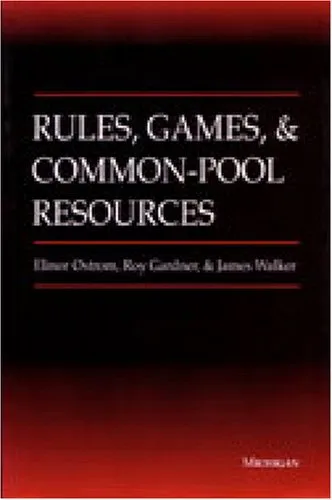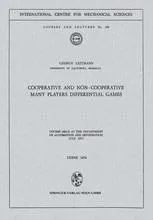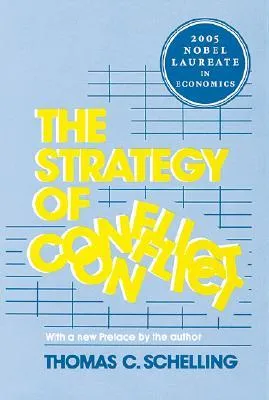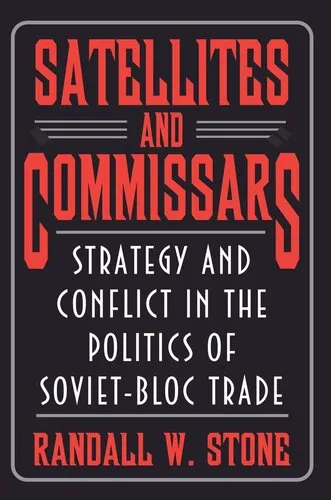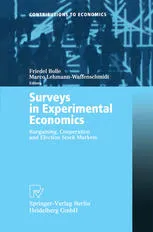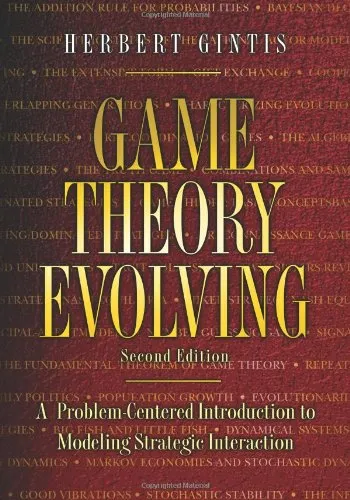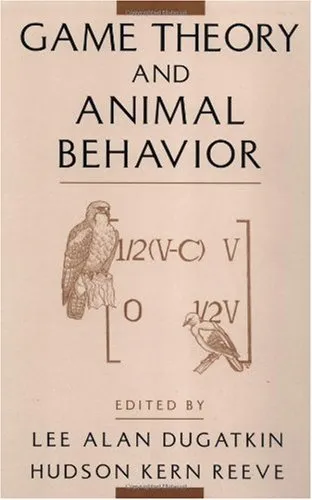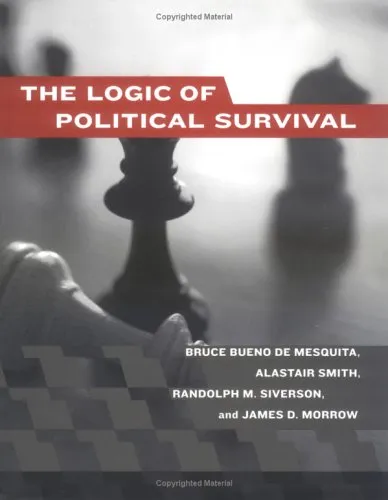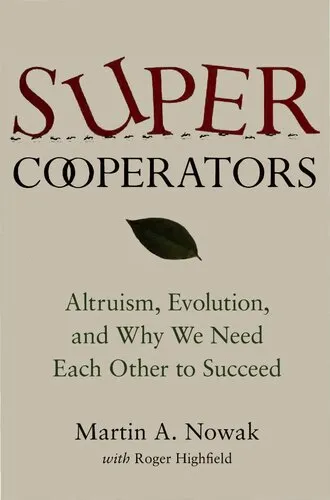Rules, Games, and Common-Pool Resources
4.6
بر اساس نظر کاربران

شما میتونید سوالاتتون در باره کتاب رو از هوش مصنوعیش بعد از ورود بپرسید
هر دانلود یا پرسش از هوش مصنوعی 2 امتیاز لازم دارد، برای بدست آوردن امتیاز رایگان، به صفحه ی راهنمای امتیازات سر بزنید و یک سری کار ارزشمند انجام بدینکتاب های مرتبط:
معرفی کتاب "Rules, Games, and Common-Pool Resources"
کتاب Rules, Games, and Common-Pool Resources یکی از آثار برجستهای است که توسط الینور استروم، روی گاردنر، و جیمی واکر نوشته شده است. این کتاب به بررسی چگونگی مدیریت منابع مشترک (Common-Pool Resources) میپردازد و از دیدگاههای نظریه بازیها (Game Theory)، قواعد حاکم بر رفتار انسانی و تجربیات واقعی برای یافتن راهکارهایی نوآورانه برای مسائل پیچیده در بهرهبرداری از منابع مشترک استفاده میکند.
خلاصهای دقیق از کتاب
کتاب "Rules, Games, and Common-Pool Resources" به موضوعات مختلفی از جمله تعامل بین عوامل انسانی و ساختار منابع مشترک در جهت حل "تراژدی منابع مشترک" (Tragedy of the Commons) میپردازد. نویسندگان، با استفاده از تحلیلهای میانرشتهای، مانند نظریه اقتصادی، علوم سیاسی، و تحلیل سیستمهای اجتماعی، توضیح میدهند که چرا قواعد و قوانین محلی، اغلب راهحلهای بهتری برای مشکلات منابع مشترک نسبت به مقررات مرکزگرایانه ارائه میدهند.
این کتاب بر پایه تحقیقات گسترده استروم و همکارانش است که بررسی میکند چگونه انسانها میتوانند به طور مستقل رفتارهای جمعی پایدار ایجاد کنند بدون نیاز به نظارت خارجی یا قانون جامع دولتی. کتاب همچنین تجربههایی عملی از جوامع محلی در مدیریت آب، جنگل، مراتع و شیلات را برجسته میکند که توانستهاند با قواعد خاص خود موفق عمل کنند. در دنیای پر از پیچیدگی امروز، کتاب بهخوبی نشان میدهد که چگونه اصول ساده مانند "مرزهای تعریف شده"، "سنجش مشوقها" و "نظارت موثر"، میتوانند منجر به پایداری منابع شوند.
نکات کلیدی از کتاب
- شرکتکنندگان در یک سیستم منابع مشترک، قادر به توسعه قواعد خودساخته برای بهینهسازی استفاده از منابع هستند.
- راهکارهای محلی که توسط جوامع ایجاد میشوند معمولاً بسیار کارآمدتر از قوانین تحمیلی دولتی عمل میکنند.
- نشان دادن نقش نظریه بازیها (Game Theory) در طراحی این قواعد و پیشبینی رفتارهای انسانی.
- تاکید بر اینکه مدیریت موفق منابع مشترک مستلزم ایجاد ساختارهای مشارکتی است که منجر به اعتماد متقابل شود.
- ارائه الگوهای مختلف برای طراحی قواعدی که قابل استفاده در شرایط گوناگون هستند.
نقلقولهای معروف از کتاب
"Trust and reciprocity are fundamental elements for the successful management of any common-pool resource."
"People don’t always act as narrow-minded individuals but can collaborate for collective goals when appropriate rules and trust are in place."
"Effective management of common-pool resources does not necessarily require centralized control but carefully tailored local solutions."
چرا این کتاب مهم است؟
کتاب "Rules, Games, and Common-Pool Resources" پایهای محکم برای درک اصول مدیریت منابع مشترک ارائه میدهد که نه تنها برای دانشپژوهان علوم اجتماعی، بلکه برای سیاستگذاران، محققان اقتصادی، و حتی مدیران کسبوکار نیز ضروری است. این کتاب با تاکید بر استفاده از انضباط محلی و رویکردهای دموکراتیک، نشان میدهد که چرا مسائل زیستمحیطی، اقتصادی و اجتماعی نیازمند رویکردهایی ترکیبی هستند.
اهمیت این کتاب در این است که به جای ارائه دستورالعملهای کلیشهای، خواننده را به فکر دعوت میکند و او را قادر میسازد که ساختارهای عملیاتی مؤثرتر برای حل مسائل پیچیده و مداوم ایجاد کند. در نهایت، پیام اصلی کتاب این است که مشکلاتی که در سطح جهانی با آنها مواجه هستیم، از قبیل تغییرات اقلیمی و تخریب منابع طبیعی، تنها از طریق همکاری و وجود قواعد منسجم محلی قابل حل هستند.
Introduction to "Rules, Games, and Common-Pool Resources"
"Rules, Games, and Common-Pool Resources" by Elinor Ostrom, Roy Gardner, and Jimmy Walker is a landmark contribution to the fields of economics, political science, and resource management. In this book, the authors delve into the complexities of managing resources that are shared by communities, termed as common-pool resources (CPRs). These are resources such as forests, fisheries, irrigation systems, and groundwater basins that are non-excludable but rivalrous, meaning overuse by one individual can diminish availability for others. The book meticulously combines theory, experimental research, and real-world cases to explore how humans create self-governance systems to solve some of the most pressing challenges associated with resource management.
The authors provide a critical analysis of how people establish and enforce rules to maintain the sustainability of CPRs, avoiding the so-called “tragedy of the commons.” Moving beyond deterministic solutions like privatization or governmental control, they delve into the nuanced, decentralized approaches communities employ to manage shared resources effectively. This book provides both theoretical frameworks and empirically informed insights, making it indispensable for students, researchers, policymakers, and resource managers interested in sustainable development and collective action.
Detailed Summary of the Book
The book is structured into several key sections that progressively build an understanding of common-pool resource problems, along with potential solutions. The authors begin by introducing the fundamental characteristics of CPRs and the unique challenges they pose. Historical cases, such as the management of Swiss alpine meadows and ancient irrigation systems in Spain, provide real-world illustrations of how diverse communities have successfully managed CPRs through self-designed rules and collective governance.
A significant part of the book focuses on game theory and experimental economics, where the authors use laboratory-based experiments to examine the behaviors of individuals when facing resource-sharing dilemmas. These experiments highlight critical concepts like trust, reciprocity, rule compliance, and the importance of norms in ensuring cooperation.
Another important contribution is the comparison between central authority-driven and locally governed resource management strategies. The authors convincingly argue that locally governed systems often outperform top-down approaches because they are context-sensitive, adaptive, and grounded in community trust. They emphasize the importance of designing rules that are fair, flexible, and enforced in a way that encourages compliance.
The book concludes with actionable insights into crafting governance systems that balance the twin objectives of efficiency and equity, making them applicable in a variety of contexts ranging from fisheries to global climate governance.
Key Takeaways
- Local communities often develop effective governance systems for managing shared resources without external intervention.
- Rules designed collectively and enforced transparently lead to greater trust and cooperation among resource users.
- Overreliance on either privatization or government control can be counterproductive, as hybrid and decentralized systems often perform better.
- Game theory and experimental studies reveal that human behavior is influenced by more than self-interest, including considerations of fairness, trust, and reciprocity.
- Success in resource management depends on institutional design principles, such as clear boundaries, conflict resolution mechanisms, and graduated sanctions.
Famous Quotes from the Book
- "A resource system’s sustainability is neither guaranteed nor doomed by its physical characteristics – the governance structures matter."
- "Individuals are capable of crafting solutions to collective-action dilemmas without necessarily relying on external authorities."
- "Rules are not just constraints; they are also enablers that channel human actions toward shared goals."
Why This Book Matters
In an era of global resource degradation, "Rules, Games, and Common-Pool Resources" provides an essential foundation for understanding how communities can work together to safeguard shared assets. The book’s insights are as relevant today as when it was first published, addressing critical issues like overfishing, deforestation, and water scarcity. Its interdisciplinary approach combines economics, political science, and sociology, making it a valuable resource for academic research and practical policymaking alike.
The groundbreaking work of Elinor Ostrom, who later went on to win the Nobel Prize in Economic Sciences, stands as a testament to the power of collective action and the potential to design institutions that balance human needs and environmental sustainability. This book not only challenges conventional wisdom but also inspires hope in the ability of communities to solve some of the most complex problems of our time.
دانلود رایگان مستقیم
شما میتونید سوالاتتون در باره کتاب رو از هوش مصنوعیش بعد از ورود بپرسید
دسترسی به کتابها از طریق پلتفرمهای قانونی و کتابخانههای عمومی نه تنها از حقوق نویسندگان و ناشران حمایت میکند، بلکه به پایداری فرهنگ کتابخوانی نیز کمک میرساند. پیش از دانلود، لحظهای به بررسی این گزینهها فکر کنید.
این کتاب رو در پلتفرم های دیگه ببینید
WorldCat به شما کمک میکنه تا کتاب ها رو در کتابخانه های سراسر دنیا پیدا کنید
امتیازها، نظرات تخصصی و صحبت ها درباره کتاب را در Goodreads ببینید
کتابهای کمیاب یا دست دوم را در AbeBooks پیدا کنید و بخرید
1483
بازدید4.6
امتیاز0
نظر98%
رضایتنظرات:
4.6
بر اساس 0 نظر کاربران
Questions & Answers
Ask questions about this book or help others by answering
No questions yet. Be the first to ask!
